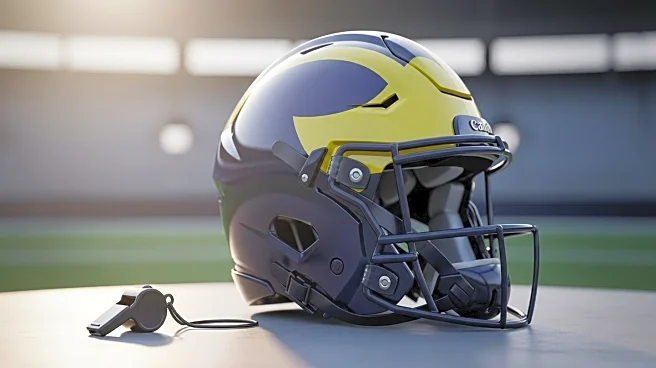What's Happening?
Michigan linebacker Jaishawn Barham will miss the first half of the upcoming game against Oklahoma due to a targeting call during the Wolverines' season opener against New Mexico. The appeal to overturn the ruling was denied, as confirmed by Wolverines coach Sherrone Moore. Barham was ejected after making facemask-to-facemask contact with New Mexico's quarterback Jack Layne during a sack in the third quarter. Moore expressed disagreement with the decision and emphasized the need for changes in college football rules regarding tackling. Barham, who transferred from Maryland, is in his second season as a starter for Michigan and was a key player last year with 66 tackles. The Wolverines are set to play the Sooners on the road, a game that holds personal significance for Moore, who played at Oklahoma and considers former coach Bob Stoops a mentor.
Why It's Important?
The denial of Michigan's appeal has significant implications for the team's defensive strategy against Oklahoma. Barham's absence in the first half could impact the Wolverines' ability to contain the Sooners' offense, especially given his role as a leading tackler. This decision also highlights ongoing debates in college football regarding the targeting rule and its impact on player safety and game dynamics. Coach Moore's comments suggest a push for rule changes, which could influence future discussions among NCAA officials and coaches. Additionally, Moore's upcoming suspension due to the NCAA's sign-stealing investigation adds another layer of complexity to Michigan's season, potentially affecting team morale and leadership.
What's Next?
Michigan will face Oklahoma on Saturday night, with Moore returning to his alma mater. Following this game, Moore will serve a two-game suspension, missing the matchups against Central Michigan and Nebraska. The Wolverines, currently ranked No. 14, will aim to maintain their standing in the AP Top 25, with the first regular-season poll set to be released soon. The outcome of the game against Oklahoma could influence their ranking and set the tone for the rest of the season. Meanwhile, discussions around the targeting rule may continue, potentially leading to future changes in college football regulations.










